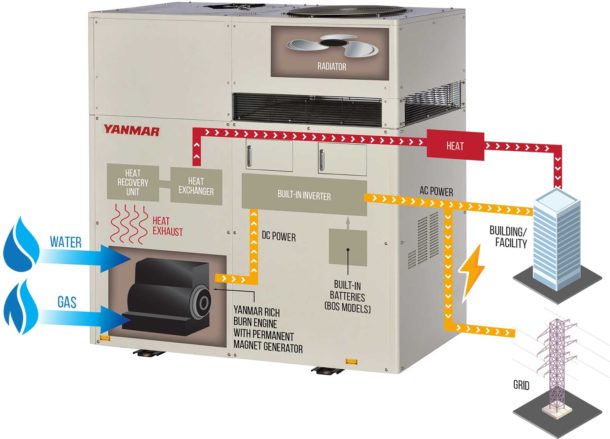Propane CHP units offer resiliency, efficiency, and environmental protection
Driven by the rising costs of electricity and increasing frequency of power outages, homeowners across the country are searching for energy solutions that are affordable, efficient, and reliable.
When it comes to efficiency, there’s no doubt that micro-combined heat and power (micro-CHP) beats electricity supplied over the grid. No longer limited to industrial and manufacturing applications, high-efficiency CHP systems have been making their way into more project types—including residential homes—through smaller micro-CHP units.

The basics of CHP and micro-CHP systems
The concept behind the micro-CHP system is simple: The unit replaces a traditional furnace or boiler and water heater with a single appliance that produces both hot water and heat as well as electricity for use in the home. Because the unit runs on propane and many units can start without power from the grid, it offers resilience and energy independence in the event of a power outage without the need for a standby generator.
Suppliers and builders who work with the technology say it can add up to considerable savings over time based on factors such as home size, location, and local electricity costs, but the value of CHP and micro-CHP units can be found nationwide.
Available in a wide range of capacities, CHP systems are ideal for single-family homes, apartment buildings, small businesses, utility power, and large commercial and industrial applications. For example, 1-3 kW units are ideal for 1,800-2,500 square foot single-family homes, 3-10 kW units work well for single-family homes with greater heating loads (like pool heating) and multi-family commercial and light industrial applications, and 10-50 kW units can power residential apartment buildings and commercial buildings (like restaurants).
Micro-CHP systems offer unmatched efficiency
A propane-powered CHP and micro-CHP unit’s total efficiency far outpaces the efficiency of traditional heating or water heating systems, providing operational savings from even the most efficient boilers.
According to the U.S. Environmental Protection Agency (EPA), the electricity that comes to a typical single-family home in the U.S. is only about 33 percent efficient. That’s because the heat used to generate it in a coal- or gas-fired power plant is lost, as is some of the electricity during transmission over high-voltage power lines.
Compare that to micro-CHP, which uses an on-site gas- or propane-fired engine to generate electricity while capturing the engine’s heat to produce hot water. These systems are typically 60 to 80 percent efficient, with some systems nearing 90 percent efficiency, according to the EPA.
CHP units are clean and environmentally friendly
Propane-powered combined heat & power (CHP) units produce significantly fewer harmful emissions, making it a better option for everyone—including customers. And as construction professionals know, environmental considerations continue to grow across the residential market.
Notably, the micro-CHP unit can reduce a home’s carbon dioxide emissions by nearly 50 percent, or 4.2 tons of carbon dioxide per year. Additionally, propane models reduce nitrogen oxide (NOx) emissions by 13 percent compared with natural gas and 50 percent compared with electric.
To determine if propane is the right fit for your next residential project, visit Propane.com.
 Bryan Cordill is director of residential and commercial business development for the Propane Education & Research Council. He can be reached at bryan.cordill@propane.com.
Bryan Cordill is director of residential and commercial business development for the Propane Education & Research Council. He can be reached at bryan.cordill@propane.com.




Join the conversation: